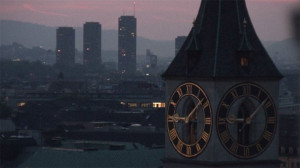Ana finds work in a cafeteria with two older, tedious women with little imagination, who also hail from nearby her home country: Ruza, the cafeteria owner and a native of Belgrade, and Mila, an older Croatian who plans to return home after retiring. The story isn’t new: Ana, a graver, quieter take on the manic pixie trope, breathes life into the stale air surrounding the two women. In the process, she inspires them to reconsider and drastically alter their life plans, before disappearing from their lives.

The Conversation
Also showing is Francis Ford Coppola’s 1974 classic, The Conversation, featuring Gene Hackman. Here, San Francisco’s Union Square is backdrop to the psychological thriller’s critical scene — when Hackman’s surveillance expert records a couple having a private conversation amidst a busy city stage. San Francisco’s architecture, public space, and energy function as setting for the scene.

Downtown Switzerland
It’s a different approach than that of Downtown Switzerland, a documentary where the city itself is the subject of the film. Shot by 4 filmmakers around Zurich, the largest city and financial heart of the country, Downtown Switzerland exposes a city struggling to come to terms with its entry into a new era. Here, the film illustrates a politically isolated country that envisions itself as a model to be emulated. A myriad of sometimes banal topics get ample treatment: transportation, city politics, women’s rights, development plans, sports teams — all revealing the ways in which the Swiss are coping with the increasing diversity and complexity of the modern age. In a particularly telling scene, a member of the country’s conservative party explains to two young teenagers his party’s policies — as they laugh in his face.

The Swissmakers
But the films aren’t just about paranoia and city politics: Rolf Lyssy’s The Swissmakers and Richard Rush’s Freebie and the Bean delve into more light-hearted material, both with a penchant for humor that plays both goofy and deadpan. Freebie and the Bean feature a buddy-cop duo, played by James Caan and Alan Arkin, who crash cars and botch jobs around the city, with the Transamerica Pyramid looming large in the background.
The Swissmakers is made in much the same vein as Freebie, featuring two Swiss agents whose job is to apply the same rigor and intensity of a full blown FBI investigation towards incredibly typical applicants for Swiss citizenship: an Italian family man with leftist leanings, a German doctor, and a Yugoslavian dancer who’s dancing partner may be a suspicious Turk. It’s a film that revels in absurdity, twisting the most minute and mundane into cause for thorough inspection, with the usual straight man/funny man duo. The Swissmakers reveals a droll, dry and ridiculous Swiss satire.

Punk Cocktail
Other notable films in the line-up include The Fall and Punk Cocktail: Zurich Scene 1976-80, both adding to a line-up that illustrates a lesser-seen Zurich through the life of a private eye and the underground punk scene. Zurich, in these films and the others included in the festival, gets a treatment that both entertains and informs its viewers on the changing landscape and demographics of the city. (It’s worth noting that there’s possibly more to learn from the Swiss films, which are likely ones the audience has never seen, as opposed to the popular and long-released San Francisco films). Those featuring San Francisco, instead, are more romantic in their handling of the city, which largely serves as a backdrop for the film’s narrative tension. Sisters they may be — but the films of Zurich and San Francisco might be more similar thematically than the cities are themselves.
Sister Cities Cinema: Zurich/SF runs October 18-20, 2013 at New People Cinema in San Francisco. For tickets and information visit sffs.org.






